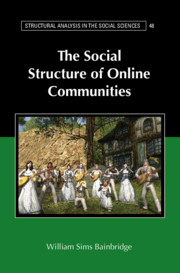Book contents
- The Social Structure of Online Communities
- Structural Analysis in the Social Sciences
- The Social Structure of Online Communities
- Copyright page
- Contents
- Preface
- 1 Introduction
- 2 Facebook
- 3 Virtual Worlds
- 4 Open-Source Software
- 5 Wikis
- 6 Citizen Social Science
- 7 Digital Government
- 8 Cultural Science
- Notes
- Index
- Series page
6 - Citizen Social Science
Published online by Cambridge University Press: 06 March 2020
- The Social Structure of Online Communities
- Structural Analysis in the Social Sciences
- The Social Structure of Online Communities
- Copyright page
- Contents
- Preface
- 1 Introduction
- 2 Facebook
- 3 Virtual Worlds
- 4 Open-Source Software
- 5 Wikis
- 6 Citizen Social Science
- 7 Digital Government
- 8 Cultural Science
- Notes
- Index
- Series page
Summary
Over the four centuries since Galileo, especially since the middle of the nineteenth century, the social structure of science has become ever more organized, possibly rigid, and definitely expensive. In some of the sciences that emphasized direct observation of physical specimens, from paleontology to archaeology to ornithology, amateurs still played a valuable role, but in the past decade professional scientists have begun to enlist ordinary citizens as unpaid but respected assistants across several of the natural sciences.
- Type
- Chapter
- Information
- The Social Structure of Online Communities , pp. 166 - 203Publisher: Cambridge University PressPrint publication year: 2020

